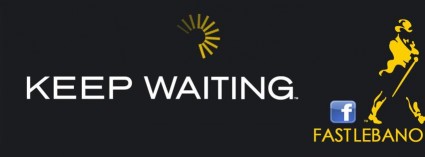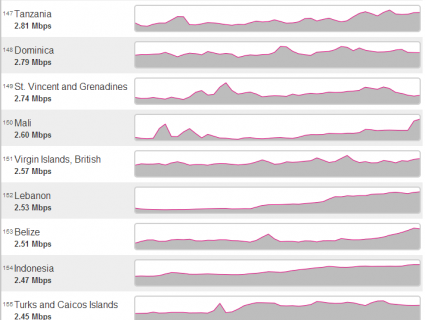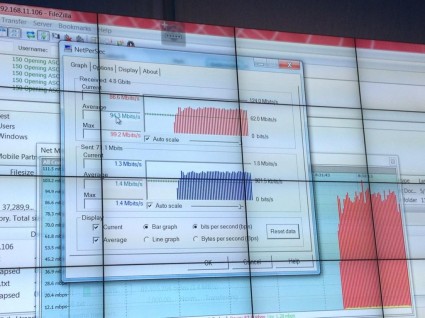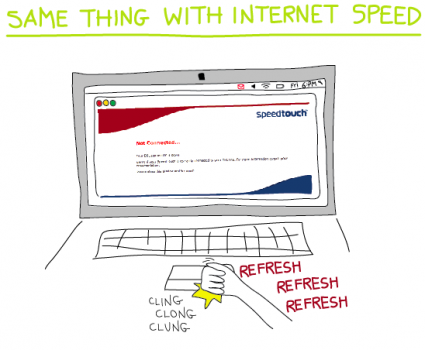
Picture taken from LebaneseWantFastInternet
I got a call last week from my internet provider (DSL connection) asking me if I was satisfied with my connection at home and their customer service. It went like this:
Operator: Hello, I am calling to see if you’ve had any problems with your internet connection in the past year and if the experience was overall satisfying.
Me: I’ve had few issues at first but I called support and resolved them.
Operator: What sort of issues? Was the connection bad?
Me: At first, the internet would stop working for no reason every few hours. After few days of troubleshooting and doing the tests support asked me to do, it turned out the problem was in the handy phone, even though I had put an isolator from the start. After I replaced the phone, I didn’t encounter any disconnections.
Operator: How about the internet? is it fast or slow?
Me: To be honest, it is barely 1Mbps even though I had requested 4Mbps but as it turns out, my phone line can’t take more than 1Mbps for reasons I could not understand yet. It seems it has something to do with the cable that comes from the “Central” or with the “Central” itself, knowing that I live very close to it.
Operator: This has to do with Ogero I am afraid. You have to check with them. I was only asking if the modem was causing any issues and if you are satisfied with the service.
Me: The modem is fine but I am barely getting 1Mbps so I don’t know if I should be satisfied or not. Anyway thank you for the follow up.
Operator: Thank you sir.

Lebanon ranked 152nd in download speed – Picture via LebaneseMemes
Taking this short chat into consideration, and given the changes that the Telecom Center has witnessed in the past 3 years, one can easily say that we have a better and cheaper internet connection nowadays (and there are numbers to prove it), but at the same time, we are still far from having a fast and reliable connection, and very far from an abundant internet. In fact and due to the lack of a proper infrastructure, a lot of areas outside Beirut and even few areas surrounding Beirut are unable to exploit connections that are higher than 1Mbps. Similarly, the 3G coverage is still relatively weak. On top of all that, phone calls are disconnecting and the network coverage is not that good specially outside Beirut.
Who is to Blame?
It comes naturally to blame the Telecom Ministry and the Government for the unstable internet but it would be unfair to do so specially with Ogero around. In fact and for the past few years, most of our internet problems have been the result of the political bickering between the Telecom Ministry and Ogero, which is ironically 100% owned by the government and supposedly acts under the supervision of the Minister of Telecommunication. However Ogero Telecom chief Abdel-Moneim Youssef does not share the same political views as the previous three Telecom ministers and as a result, every time there’s a problem, each side puts the blame on the other. Ogero claims that it’s struggling financially and that the Telecom Ministry is withholding money from it and breaking the law on several occasions while the ministry accuses Ogero of a lack of cooperation and even filed a lawsuit against them.
I will not bother go into details as to who’s right or who’s wrong because the mere presence of Ogero for me does not make sense. Having a state-owned (privately-managed) entity controlling the Telecom sector is a recipe for disaster and the past years are a clear proof of that. Regardless of political affiliations, it is illogical to let one company control everything and then expect other privately owned ISPs to compete with it. I am not saying Ogero is bad but this monopoly is an obstacle to a healthy competition and should be halted either through privatization or other means. Last but not least, I think more efforts should have been put by both sides to settle the differences as we’ve wasted precious years and are now way behind technologically.

4G Live Test reaching peak of 100Mbits/s – Picture taken by @NicolaSehanoui
Is launching the 4G a good or bad idea?
When the 3G was launched back in 2011, the pilot phase was excellent but when the service became available to all, it sucked for few months before it became relatively stable. A lot of people, including myself, criticized this premature launch but come to think of it, I think this may be the only way to get things done in Lebanon, or should I say the least worse and most effective way in the climate we live in.
What I am saying is that we’ve waited the DSL service for years before it got implemented in a wrong and illogical way. Similarly, the 3G was not expected, yet was rushed and we suffered for a while but at least now we have both services running even if they are way below our expectations. The number of internet users has increased in Lebanon and the demand for a better internet has become a necessity, after it was a luxury with the prices we had few years back (I used to pay 70$ monthly for 2GB download on a 512Kb connection). Don’t get me wrong, I am not saying we should settle for what we have right now but we didn’t have to wait another 10 years for Ogero and the Ministry to get along. 3G and DSL are now a reality and whomever takes over will be pressured to improve them or introduce new services. Added to that, whenever something bad happens, like the outage we had last year, both sides will have to fix things quickly and consequently back then, we got hooked to a new international cable. Remember that this specific ministry brings the government billions of dollars in returns yearly.
This being said, I say we should go for the 4G and hope for more outages or problems that will get things moving more quickly. With the internet penetration already at 56% and on the rise, end-users and businesses will make the Ministry and Ogero’s lives a living hell every time the service stops. After all the internet is not like electricity or water as you only have one source so this monopoly that they’ve created will backfire at them.

Picture via MayaZankoul
What now?
The internet was down for around 3 hours yesterday due to an electrical problem, and it was disconnecting all the time today and still is. We should expect major improvements in the next few weeks or months but nothing’s confirmed yet. 4G pilot phase is on but I wasn’t able to get my hands on a dongle to try it out and there’s barely any mention of the distributed dongles, so I doubt that its official launch is anytime soon. The data caps are still ridiculously low and were not doubled as promised by the minister.
Speaking of Sehnaoui, I’ve had the chance to meet with him over dinner and he’s a very pleasant person to talk to. I told him and I said it out loud that he’s doing a much better job than other ministers, despite few mistakes and controversies, but that Lebanon becoming a regional digital hub is an idea that is a bit far fetched and that we should put more focus on schools and universities. Chances that he comes back as a Telecom Minister are slim but I am glad that he decided to go through with the 4G as whomever comes after him will have to make it work and not waste years to launch it.
Until then, we as Lebanese should continue to raise the alarm, make use of the ever growing social media and hope that it will make a bigger difference in the upcoming elections. Keep in mind that internet access has become a fundamental human right in some countries and that a free, abundant and fast internet is what we’re after.









That’s a nice article which is quite comprehensive while at the same time managing to duck the controversial issues plaguing the sector.
As someone who has worked in this field since 1998 both in Ogero and one of the mobile operator I have grown quite cynical of any decent prospect for the country.
I saw DSL initially tested in 2000 only to be launched a decade later. I also have seen the practices of the companies managing the mobile sector.
Their main focus is not to deliver decent working service as per the MoTs specs but how to shift OPEX to CAPEX since CAPEX is paid by MoT while OPEX is paid out of their own pockets.
This has been reflected in various areas of what was a pioneer sector during thr BOT period under Cellis & Libancell.
The quality of staffing in both companies has degraded heavily as both operators look to cut on personnel cost, hiring cheaper staff and driving experienced veterans to leave by depriving them of decent pay and promotion.
Political interference is often high and key position often get filled by people who are parachuted in. (…pretty much like everywhere else)
I totally support your desire to has faster cheaper stronger internet.
I also agree that Minister Sehnaoui was among the best people to have appointed in his job (and I have seen plenty of minister of telco).
I however don’t think 4G will solve anything except give more room for inflammatory material for debate by hardcore political partisans from each side.
The Lebanese you expect will raise to demand decent service will only polarize themselves and rise up to slander each others as each takes the side of his/her political party.
As for Lebanon becoming a digital hub…have you been to Dubai recently?
Thx Nagib. Very well covered.
Needless to highlight the following issues:
– Price:
DSL & 3G price over quality is still very high
– International Cables:
e.g. Cyprus has 7 international cables while Lebanon only has 3. #wYaDob
(chil Abdel Menem Youssef) and increase the number of international cables will avoid another internet outages; prices will decrease and internet speed will increase
– Digital hub (?):
very hard to attract big companies with current internet infrastructure #Obviously
– Internet in rural areas:
“Centrales” in rural areas need better planning and optimization. Some people pay for the 1 Mbps service fee and they don’t even get the 512 speed! #unfair
– 3G Radio Antenas:
it should be well placed geographically based on technical planning/scanning and not based on the rule of the lebanese “election services” that make few people benefitting from its finical revenues over the quality of the coverage. Placing these antenas in the wrong locations will not improve the network coverage that much #fact
– Neighboring networks:
Still, some areas in North (e.g tripoli/Akkar..) can detect SyriaTel’s radio signals which raise some security questions #3addeWlShabbeb
– Fiber Optics(?):
Any updates from the fiber optics project all over Lebanon?? (walla 3a 2iyem wled wledna?)
>> It’s very sad to mention that lot of Lebanese telecom engineers are leading huge telecom projects worldwide (Canada/Australia/Africa/MEA..) while in Lebanon we still don’t have a stable 2G network!
Thanks-
Nader
#too #many #hashtags #! #! #!
I always believed that internet access should be a right, not a privilege. I remember flying through Egypt and Tunisia in early 2009–the airports were fully equipped with free, unlimited internet access in all passenger lounge areas. The sad thing is that these countries are far less developed than our own, and that that encounter was FOUR years ago. I can’t say the 30-minute free wifi session recently introduced at Rafic Hariri International is a marked improvement.
” The sad thing is that these countries are far less developed than our own…”
Are you sure?…or is it the same nostalgic dream we all keep having?
How is that? In which way is Lebanon more developed than Tunis?
The Human Development Index is a “comparative measure of life expectancy, literacy, education, standards of living, and quality of life for countries worldwide. It is used to distinguish whether the country is a developed, a developing or an underdeveloped country, and also to measure the impact of economic policies on quality of life” (http://en.wikipedia.org/wiki/List_of_countries_by_Human_Development_Index).
Here are the rankings and corresponding index values:
Lebanon #72, 0.745
Tunisia #94, 0.712
Egypt #112, 0.662
Hi Danielle, but that proves nothing! I agree with Gianni, you have to look on the ground; these indexes are not a proof. Tunisia is much much more developed than Leb…
my shit has developed in 4 years more than Lebanon has developed in 15 years